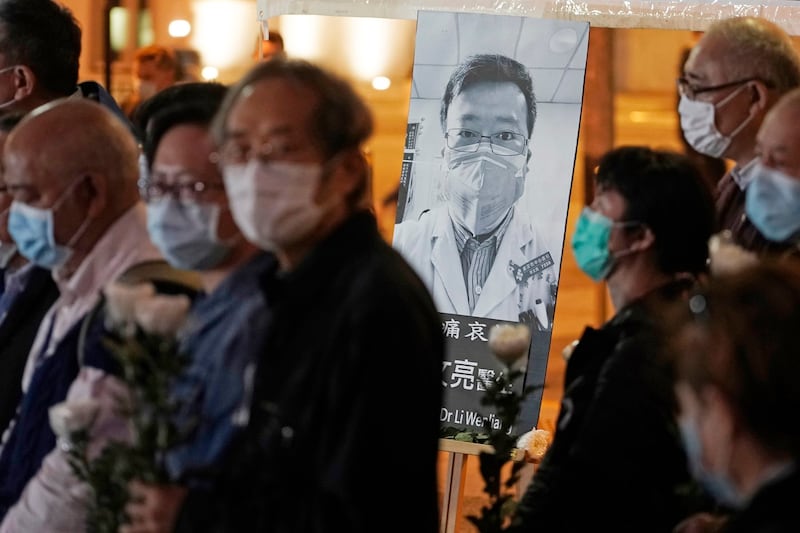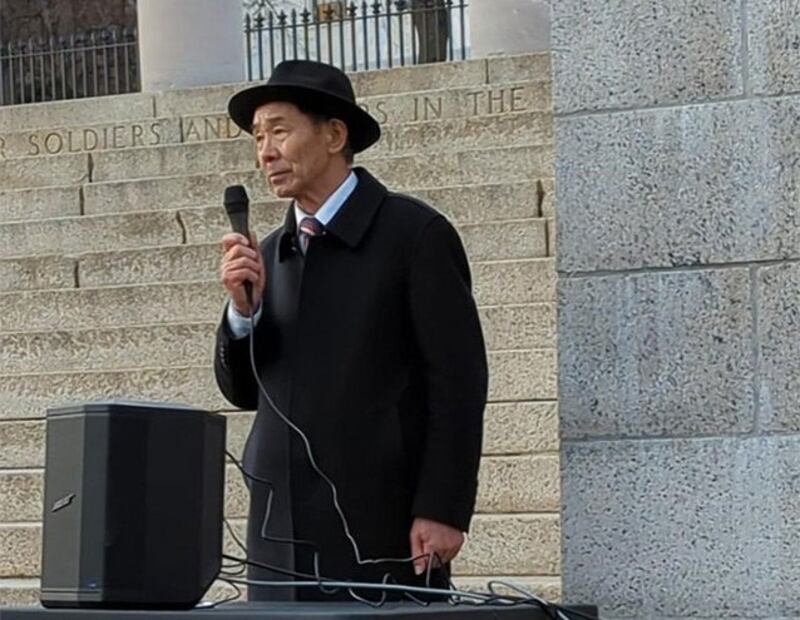Former Xiamen University professor You Shengdong cuts quite a figure around Harvard University. Neatly dressed in a fedora and long black coat, the septuagenarian retired professor recently braved the chill Bostonian winds to mark the third anniversary of the death of Wuhan doctor and COVID-19 whistleblower Li Wenliang on Feb. 5.
Fired amid an ongoing purge of higher education institutions for making "politically inappropriate" comments in class, You addressed the rally from the podium, delivering a speech from a closely scrawled piece of paper.
"Today is the traditional Chinese Lantern Festival," You said. "We are here to commemorate Mr. Li Wenliang who unfortunately died three years ago trying to save lives."
The following day, You remained ebullient about the current willingness of Chinese people to stand up and speak truth to power, particularly during the recent wave of "white paper" protests sparked by a deadly lockdown fire in Xinjiang's regional capital Urumqi, some of which featured calls for Chinese leader Xi Jinping to step down and call elections.
"For one person to come out [in protest] these days is the equivalent of 100 people coming out during the Tiananmen Square protests [of 1989]," You told Radio Free Asia, in a reference to the much tighter controls, censorship of dissent and individual high-tech surveillance that potential protesters in China have to deal with today.
"It's admirable that so many students turned out, even though they had to wear masks and hats to protect themselves," he said. "They all ran the risk of getting kicked out [of their schools], or being placed under surveillance."
"The white paper protests were spontaneous; nobody organized them," he said. "It was pretty amazing that people turned out in such large numbers."
"Young people today are still speaking out despite the close monitoring and surveillance they are under," You said. "They are the spirit of the Chinese people, and the backbone of the Chinese nation."
Greater risks
He said Chinese leader Xi Jinping has presided over an unprecedented degree of control and censorship of public speech, as well as ever-greater risks for dissidents, activists and whistleblowers like Li Wenliang, since taking power in 2012.
"Incidents like Li Wenliang's whistleblowing have created a few ripples, fragments [of dissent] since Xi Jinping took power," You said, adding: "There have been so many of them, but very few become publicly known."

He said he doesn't regard a life without free speech as fully human.
"Are you a modern, civilized person without the right to speak? Are you even human at all, if all you can use your mouth for is eating?"
"[We were always taught that] they stopped ordinary people from speaking out in feudal times, but I think [our current existence] is empty without freedom of the press, freedom of expression," he said.
Regarding his sacking from his job, You said he can remember telling students to ignore official phrases like "positive energy," when used by state broadcaster CCTV and Communist Party mouthpiece the People's Daily.
He also told them that Xi Jinping's buzzword, the "Chinese dream," was a fantasy rather than a practical aim, and shouldn't be used in the classroom.
You also banned the phrases, Father Xi and Mother Peng, another catchphrase used by state media to refer to Xi and his wife Peng Liyuan, implying that the first couple were the mother and father of the Chinese people.
Unbeknown to him, some students had been secretly recording his classes and reporting his " taboo" comments back to the powers that be.
"The school was planning to fire me, but I knew nothing of this beforehand," You said.
Online petition
The first he heard of the trouble that was coming was on June 14, 2018, when his students told him they had been unable to sign up for his classes.
"When I asked about it later, the secretary told me ... that the school was notifying me that I would no longer have any classes," You said.
Hundreds of students signed an online petition to ask for his teaching to be restored, but to no avail.
"I admire Professor You's courage and outspokenness," wrote one, while another referred to him as a "respected scholar forced to resign after being framed by his students."
"The students were getting ready to demonstrate, petition, put up banners and set up dozens of WeChat groups," You said. "The university authorities told me they would have to go public with the details of the case if I didn't calm them down."
"Given the pressure they were under from higher up, they would have fired me even if 10,000 or 20,000 students [supported me]," he said.
You said he was also punished for giving interviews to overseas media.
"The school told me later that this wasn't allowed, but I didn't know that, because [China's] constitution says that its citizens have freedom of speech, not that they can only give interviews to the People's Daily," he said.
"This was taboo, I guess."
'Little Pinks everywhere'
Asked how he feels now about the "informants" in his own classroom, You laughed and shrugged.
"There are Little Pinks everywhere, and as long as those in power encourage them, there will always be someone who does that kind of thing," he said in a reference to supporters of the Chinese Communist Party.
You has now adopted Harvard, where he works as a researcher at the Fairbank Center for Chinese Studies, as a second home, but still maintains a keen eye on political developments back home.
"If the current line is maintained, backed up by violence and deception, [the regime] will not last long," he said.
"I believe that Xiamen University will hire me back, and I'll go back to lecture there."

The Chinese Communist Party under Xi launched a nationwide political campaign targeting higher education institutions in China, with a number of outspoken professors losing their jobs as a result of "taboo" comments to students.
The overseas-based group Chinese Human Rights Defenders estimated in 2018 that at least six professors were affected by the purges, of whom four were fired.
Guizhou University professor Yang Shaozheng was fired after he made comments critical of the ruling Chinese Communist Party in an online article.
Yang received notice in Aug. 2018 that he would stop receiving wages in 20 days, and his appeal against the decision was rejected on Sept. 30, 2018, the group said.
You's former colleague Xiamen University history professor Zhou Yunzhong was also fired on Sept. 1, 2018 after he made "inflammatory" comments about Chinese society on his social media account.
Translated by Luisetta Mudie.
